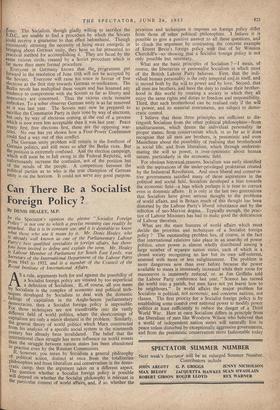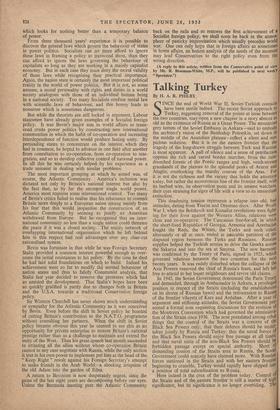Can There Be a Socialist Foreign Policy ?.
BY DENIS HEALEY, M.P.
In the Spectator's opinion the phrase " Socialist Foreign Policy" is not one to which a precise meaning can readily be attached. But it is in constant use, and it is desirable to know what those who use it mean by it. Mr. Denis Healey, who is already well known as one of the Parliamentary Labour Party's best qualified specialists in foreign affairs, has there- fore been invited to define and explain the term. Mr. Healey is Labour Member of Parliament for South East Leeds, was Secretary of the International Department of the Labour Party from 1945 to 1952, and is a member of the Council of the Royal Institute of International Affairs.
S a rule, arguments both for and against the possibility of a Socialist foreign policy are vitiated by too superficial a definition of Socialism. If, of course, all you mean by Socialism is the complex of economic and political tech- niques developed by Socialists to deal with the domestic failings of capitalism in the Anglo-Saxon parliamentary democracies, then a Socialist foreign policy is impossible: For those techniques are not transferable into the vastly different field of world politics, where the \ shortcomings of capitalism are only a minor element in the problem. Similarly, the general theory of world politics which Marx constructed from his analysis of a specific social system in the nineteenth century has already been invalidated. The belief that the international class struggle has more influence on world events than the struggle between nation states has been abandoned in practice even by the Russian Communists. If, however, you mean by Socialism a general philosophy of political action, distinct at once from the totalitarian , philosophies and from liberalism and conservatism in the demo- cratic camp, then the argument takes on a different aspect. The question whether a Socialist foreign policy, is possible Will depend on whether the Socialist philosophy is relevant in the particular Context of world affairs, and, if so, whether the priorities and techniques it impo$es on foreign policy differ from those of other political philosophies. I believe it is possible to give a .positive answer to all these questions, and to clinch the argument by contrasting the concrete example of Ernest 13evin's foreign policy with that of Sir Winston Churchill's—so showing that a Socialist 'foreign policy is not only possible but necessary.
What are the basic principles of Socialism ?—I mean, of course, the libertarian or personalist Socialism in which most of the British Labour Party believes. First, that the indi- vidual human personality is the only temporal end,in itself, and is moved both by the will to power and' by love. Second, that all men are brothers, and have the duty to realise their brother- hood in this world by creating a society in which they all enjoy the same rights and duties to freedom and responsibility. Third, that such brotherhood can be realised only if the will to power, and its material instruments, are subject to demo- cratic control.
I believe that these three principles are sufficient to dis- tinguish Socialism from the other political philosophies—from totalitarianism, which denies the individual, personality its proper status; from conservatism which, in so far as it- does - recognise that all men are brothers, is pessimistic and even Manichean about the possibility of realising that brotherhood in social life; and from liberalism, which through underesti- Mating the will to power, is over-optimistic about human nature, particularly in the economic field.
For obvious historical reasons, Socialism was early identified with the aspirations of the under-privileged proletariat created by the Industrial Revolution, And since liberal and conserva- tive governments satisfied many of those aspirations in the political and social field, Socialists developed a bias towards the economic field—a bias which perhaps it is time to correct even in domestic affairs. It is only in the last two generations that Socialists have given serious thought to the problems of world affairs, and in Britain much of this thought has been distorted by the Labour Party's liberal inheritance and by the infection of neo-Marxist dogma. Typically enough, the prac- tice of Labour Ministers has had to make good the deficiencies of Labour theorists. '
What are the main features of world affairs which must decide the priorities and techniques of a Socialist foreign policy ? The outstanding problem lies, of course, in the fact that international relations take place in an anarchy of power politics, since power is almost wholly distributed among a large number of separate nation states, each of which is a closed society recognising no law but its own self-interest, assessed with more or less enlightenment. The problem is more dangerous, now than ever before because the power available to states is immensely increased while their room for manoeuvre is immensely reduced, or, as Jim Griffiths told the Labour Party conference last year, " Science has turned the world into a parish, but men have not yet learnt how to be neighbours." In world affairs the major problem for Socialists is political, not economic, and concerns nations, not classes. The first priority for a Socialist foreign policy is by establishing some control over national power to modify power politics at least sufficiently to reduce the danger of a Third World War. Here at once Socialism differs in principle from the liberalism of men like Woodrow Wilson who believed that a world of independent nation states will naturally live' in peace unless disturbed by exceptionally aggressive governments, and from the pessimistic conservatism More fashionable today which looks for nothing better than a temporary balance of power.
From three thousand years' experience it is possible to discover the general laws which govern the behaviour of states in power politics. Socialists can no more afford to ignore these laws in framing a policy to transcend them, than they can afford to ignore the laws governing the behaviour of capitalists So long as they are working in a mainly capitalist economy. But in each case they must deny the moral validity of those laws while recognising their practical importance. Again, the nation state is certainly the most important political reality in the world of power politics. But it is not, as some assume, a moral personality with rights and duties in a world society analogous with those of an individual human being in a national society. Too many Socialists confuse moral law with scientific laws of behaviour, and this heresy leads to nonsense which is sometimes dangerous.
But while the theorists are still locked in argument, Labour statesmen have already given examples of a Socialist foreign policy. It was Bevin's major aim in world affairs to trans- cend crude power politics by constructing new international communities in which the habit of co-operation and increasing interdependence of function would produce lasting unity. By persuading states to, concentrate on the interest which they had in common, he hoped to advance in one field after another from consultation to co-operation, from co-operation to inte- gration, and so to develop collective control of national power. In all this he was certainly helped, by his experience as a trade unionist in dealing with similar problems. • The most important grouping at which he aimed was, of course, the Atlantic Community. America's inclusion was dictated not only by Britain's national interest but also by the fact that, as by far the strongest single world power, America most requires some international control. Too many of Bevin's critics failed to realise that his reluctance to commit Britain more deeply to a European union sprang mainly from his fear that this would jeopardise the construction of an Atlantic' Community by seeming to justify, an American withdrawal from Europe. But he recognised that an inter- national community no less than a single nation could threaten the peace if it was a closed society. The untidy network of overlapping international organisation which he left behind him in this respect had real advantages over any clear-cut rationalised system.
Bevin was fortunate in that while he was Foreign Secretary Stalin provided a common interest powerful enough to over- come the initial resistances to his policy., By the time he died he had laid solid foundations on which to build. Indeed his achievement went so far to modify the normal behaviour of nation states and thus to falsify Communist analysis, that Stalin last year decided to remove the pressures which had so assisted the development. That Stalin's hopes have been so quickly gratified is partly due to changes both in Britain and the U.S.A. towards a traditional Conservative foreign policy.
Sir Winston Churchill has never shown much understanding or sympathy for the Atlantic Community as it was conceived by Bevin. Even before the shift in Soviet policy he boasted of cutting Britain's contribution to the N.A.T.O. programme without consulting her partners. When the shift in Soviet policy became obvious this year he seemed to see this as an opportunity for private enterprise to restore Britain's national prestige rather than as a challenge to maintain and extend the unity of the West. Thus his great speech last month succeeded in irritating all the allies without whose co-operation Britain cannot in any case negotiate with Russia, while the only section it was in his own power to implement put him at the head of the- " Keep Right " revolt against his Foreign Secretary's attempt . to make friends in the Arab World—a shocking irruption of the old Adam into the garden of Eden.
A return to Bevinism is now desperately urgent, since the gains of the last eight years are decomposing before our eyes. Unless the Bermuda meeting puts the Atlantic Community back on the rails and so restores the first achievement of a Socialist foreign policy, we shall soon be back in the atmos- phere of panicky improvisation which usually precedes world war. One can only hope that in foreign affairs as sometimes in home affairs, an honest analysis of the needs of the moment may lead Conservatives to the right policy even from the wrong direction.
(A reply to this article, written from the Conservative point of vice by Mr. R. Brooman-White, M.P., will be published in next week's " Spectator.")



































 Previous page
Previous page